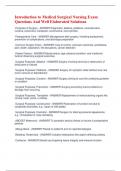Introduction to Medical Surgical Nursing Exam
Questions And Well Elaborated Solutions
Purposes of Surgery - ANSWER Diagnostic, ablative, palliative, reconstructive,
curative, preventive, transplant, constructive, and cosmetic
Postoperative Care - ANSWER Management after surgery, including assessment,
prevention of complications, and discharge preparation
Common Surgery Fears - ANSWER Loss of control, unknown outcomes, anesthesia,
pain, death, separation, life disruptions, cancer detection
Patient Factors - ANSWER Mental status, age, physical condition, and nutritional
factors influencing surgical outcomes
Surgical Purposes: Ablative - ANSWER Surgery involving removal or destruction of
body parts or tissues
Surgical Purposes: Palliative - ANSWER Surgery for symptom relief without cure, like
tumor removal or debridement
Surgical Purposes: Curative - ANSWER Surgery aiming to cure the underlying problem
or condition
Surgical Purposes: Preventive - ANSWER Surgery preventing future problems or
damage from occurring
Surgical Purposes: Transplant - ANSWER Replacement of malfunctioning organs like
cornea, heart, joints, or kidney
Surgical Purposes: Constructive - ANSWER Restoration of function lost due to
congenital anomalies, e.g., repair of cleft palate
Surgical Purposes: Cosmetic - ANSWER Surgery for altering personal appearance,
e.g., rhinoplasty for nose reshaping
ABCDEF Mnemonic - ANSWER To ascertain serious illness or trauma in preoperative
patients
Allergy Band - ANSWER Placed on patient's arm for reported allergies
Bleeding Tendencies - ANSWER Includes medications like aspirin affecting clotting
Cortisone - ANSWER Steroid use impairing tissue integrity and immune function
, Diabetes Mellitus - ANSWER Requires strict blood glucose control and delays wound
healing
Perioperative Nursing - ANSWER Nurse's role throughout surgical experience,
emphasizing continuity and nursing process
Informed Consent - ANSWER Patient's competent agreement with clear information,
risks, benefits, and consequences
Anesthesia Types - ANSWER General, regional, and local anesthesia, including
conscious sedation
Surgical Classification - ANSWER Emergent, urgent, and elective surgery distinctions
based on immediacy and necessity
Emboli - ANSWER Previous embolic events may recur due to immobility
Fighting Ability - ANSWER Immune-suppressed patients are at higher risk of infections
Laboratory Tests - ANSWER Include urinalysis, CBC, blood chemistry profile, and CMP
Diagnostic Imaging - ANSWER Involves chest x-ray and evaluation of comorbidities
Cardiac Evaluation - ANSWER Includes an electrocardiogram
Medication Impact - ANSWER Consideration of allergies, prescription, OTC, and herbal
meds
Aspirin - ANSWER An antiplatelet agent increasing hemorrhage risk
Echinacea - ANSWER Used for cold symptoms, with potential liver impact
Ephedra Sinica - ANSWER Used as a decongestant and for weight loss, with cardiac
risks
Feverfew - ANSWER For migraine prevention, with anticoagulation factors
Garlic - ANSWER Boosts immunity, affects blood pressure, and may increase bleeding
Ginger - ANSWER Used for cough, cramps, gas, with clotting time risks
Ginkgo Biloba - ANSWER Improves brain function, may increase bleeding risk
Ginseng - ANSWER Promotes overall well-being, may affect anesthetic requirements
Guarana - ANSWER Enhances alertness, may reduce warfarin efficacy




